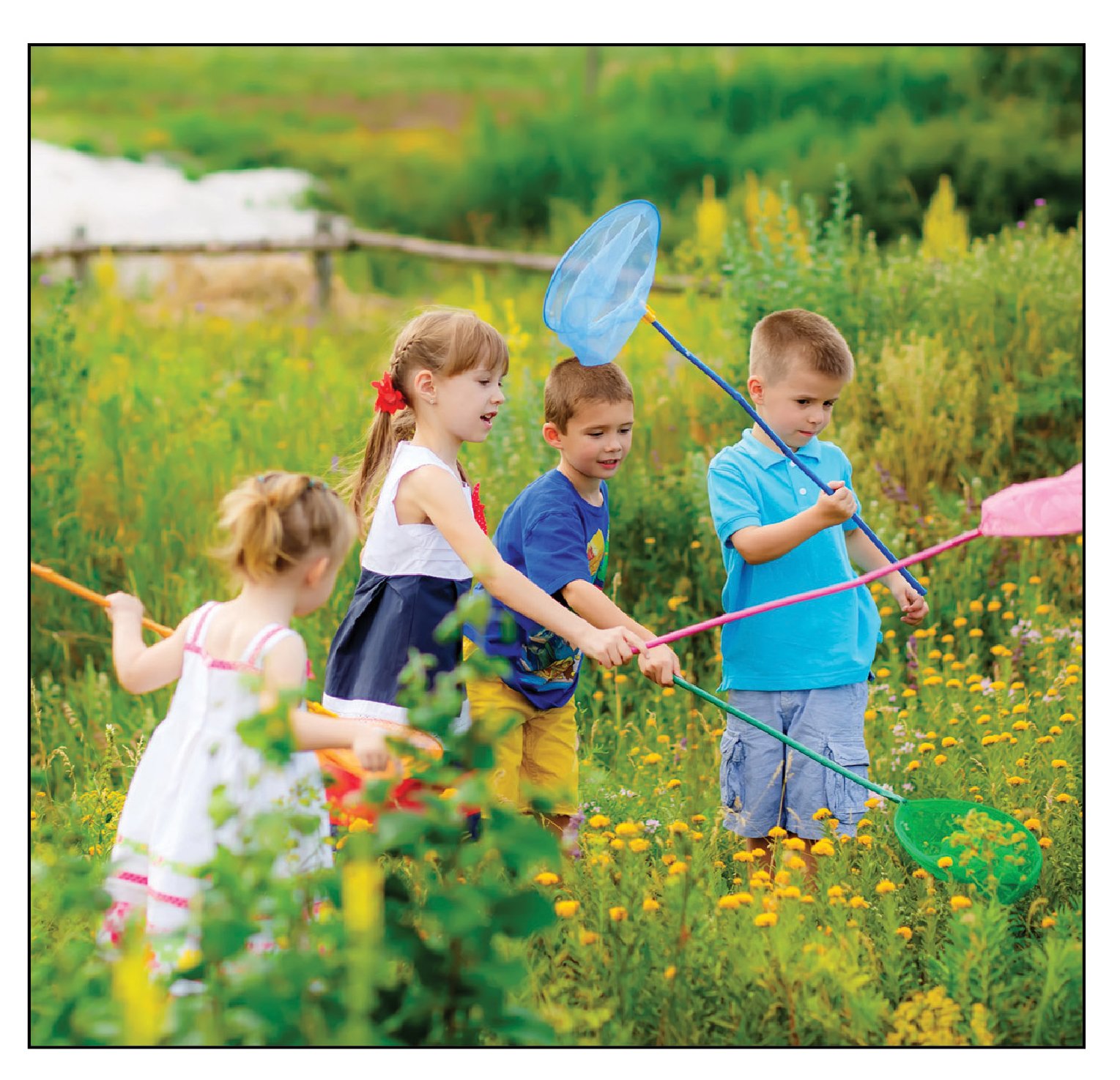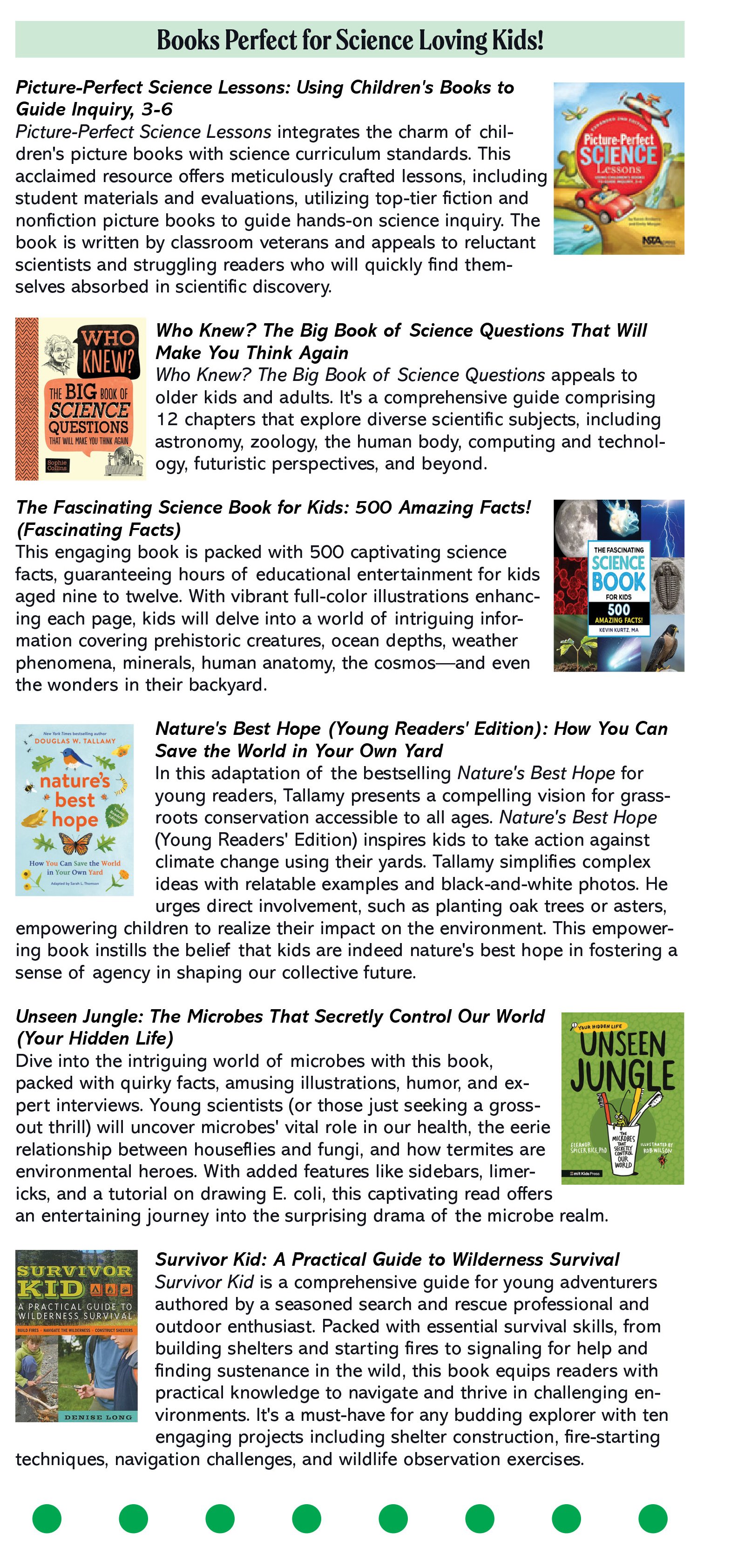By Christine MacIntyre
Imagine a world where your children are captivated by bubbling potions, erupting volcanoes, and soaring rockets. In this magical realm, adventure awaits. From makeshift kitchen laboratories and hands-on classes to information-packed books, parents can ignite the spark or fuel the burning passion for science with various engaging and immersive activities—some at home, some in person. Unlocking the magic of science begins with nurturing your child’s natural curiosity. Observe what they're interested in and use it to pave the way for exciting career paths in the future. Encourage them to explore the world around them, from the captivating chemical reactions in the kitchen to the physics behind building structures and the behaviors of animals.
Discovering science can be exciting and easy. You can support your children's interest in science by connecting it to their passions. For example, if they love baseball, you can teach them the physics of how baseballs move through space and the impact of gravity. Or, if they're into video games, you can explore the electrical signals and coding that powers their favorite games.
Encourage your children to ask countless questions and craft their theories about the mysteries of nature and the marvels of science. Engage in conversations about captivating scientific topics, let them see your enthusiasm for science, and explore a spectrum of scientific fields together. It's a journey of discovery that you can take together!
Science is not just confined to textbooks and labs. It's everywhere, all the time! By helping your children recognize science's profound influence in the world, you can instill a deep appreciation that enriches their journey of discovery. Let curiosity be your compass, whether stargazing, dissecting a frog, or whipping up a batch of slime.
Dive in, explore fearlessly, and embrace the exhilarating journey of discovery that science offers. Who knows what amazing revelations await just beyond the horizon?
Immersive Science Experiences & Camps in the Ann Arbor Area
Apple Scouts — Apple Playschools
Apple Playschools' Apple Scouts program is an immersive outdoor camp for children of all ages that embraces the international movement to "rewild" childhood.
"We do this by providing campers opportunities to explore and learn through their interactions with nature. We are outside, rain or shine, hiking, exploring, and letting our campers’ observations and curiosities guide our discussions, activities, and excursions," said Pentyi Delforge, Apple Scouts Camp Director.
From hiking and tracking to mapping and building, campers engage in child-initiated activities that foster a deep appreciation for the local preserves, woods, and trails. Amidst the beauty of nature, they establish meaningful connections with plants and animals, developing a sense of stewardship for the environment.
Delforge said they allow campers to engage in risky play by teaching them how to do it in a safe and respectful environment. They are a self-acclaimed "muddy and messy camp." "I often think of Ms. Frizzle's educational philosophy [the teacher character in the Magic Schoolbus books] when it comes to our camp, ‘Take chances, make mistakes, get messy!’” quoted Delforge.
Apple Scouts offers an unforgettable experience where children can grow alongside the natural world, guided by trusted mentors, and surrounded by the wonders of the great outdoors. It is the perfect place where curiosity thrives, and tomorrow's environmental stewards are born.
Sessions are open to youth who have completed Young 5's/Kindergarten through 5th grade. Campers will be assigned to a mixed-age group during their session. Learn more at appleplayschools.org or call (734) 215-5277. Apple Play Schools is located at 900 South Seventh Street in Ann Arbor.
The Future Innovators Academy
This new and growing, small, Ann Arbor-based business is passionate about providing quality S.T.E.M. education. Their goal is to make S.T.E.M. approachable and enjoyable for all kids. The Future Innovators Academy summer camps are packed with exciting activities designed to spark creativity and innovation.
The Future Innovators Academy founder Andi Sperry says their philosophy centers on "hands-on, project-based learning." From robotics to A.I., they offer a platform where kids can engage in real-world robotics, electronics, and coding through exploration, creation, and learning. "We believe that by providing a nurturing environment that combines education with real-world applications, we can inspire the next generation of scientists, engineers, and innovators," said Sperry.
According to Sperry, their programs are led by experienced engineers and computer science enthusiasts. Camps are structured, yet flexible, with a blend of four structured learning workshops complemented by periods of unstructured creative innovation. Campers receive electronic kits which are integral to their learning journey. From CAD design to circuit building, block coding to C++ text coding, and 3D printing, these programs provide inclusive and extensive learning backed by safety basics and a solid understanding of fundamental skills.
Two separate weekly camps cater to grades 3-5 and 6-8. In addition to camps, The Future Innovators Academy hosts exciting kids' night out with themes like Lego, Roblox, and Minecraft. They also offer a kids' coding club with drop-in sessions featuring unique projects that challenge creativity.
Learn more through their website thefutureinnovatorsacademy.com/lead-collection, or give them a call at (207) 671-6284. The Future Innovators Academy is located at 3909 Research Park Drive, Suite 400, Ann Arbor.
Michigan Science Center
The Michigan Science Center features live stage shows, an IMAX® Dome, a 4D theater, a Planetarium, an 8,700 square foot special exhibit hall, and 220+ interactive exhibits. MiSci offers plenty of immersive and engaging science-based exploration for kids and adults alike. Each exhibit, program, and science show meets the objective of helping children embrace S.T.E.M. Each explores various S.T.E.M. topics and promotes literacy and understanding of the natural world and the built environment.
The latest exhibition, "Above & Beyond," promises to take explorers on an out-of-this-world adventure. It offers a thrilling opportunity to race friends at the speed of sound, take a breathtaking 360-degree view of Earth from orbit, and embark on a fascinating journey to Mars. The exhibit showcases flying cars, supersonic planes, space elevators, and mega-rockets. It promises to take thrill seekers and inquisitive minds faster, farther, and higher for a once-in-a-lifetime experience. The exhibition runs through September.
Permanent experiences include the interactive Design Zone, a planetarium, and an official NASA Space Place. Mi-Sci also has a science store that offers various items curated to all aspects of S.T.E.A.M., with an emphasis on sourcing from small or sustainability-focused vendors. It's a perfect one-stop-shop for science kits, toys, puzzles, and more.
Mi-Sci's Spark! Camps “allow kids to explore interactive exhibits, engage in immersive theater experiences, and investigate science phenomena through hands-on activities and experiments,” according to their website. Camps target three different age levels with age-appropriate lesson plans. For example, older camp groups have more advanced materials with a heavier focus on technology and week-long projects.
For the youngest scientists, ages two through five, the Young Explorers Program provides opportunities to explore age appropriate S.T.E.M. topics based on themes. These classes incorporate elements such as literacy, social-emotional learning, play, pattern recognition, and improving motor skills. The included activities and crafts are designed to be completed with the assistance of the caregiver.
Families can tune in for distance learning at-home options every Wednesday at 2:30 p.m. as Mi-Sci educators present live science experiments from their Distance Learning studio for free. During the live broadcast, they show some of their biggest and most exciting large-scale science demos. Programs are broadcast live on the Mi-Sci Facebook page and YouTube channel; no registration is required.
Find more information on the website at mi-sci.org/ or call (313) 577-8400. You can find the free presentations online at facebook.com/MI.Science.Center or their Youtube page at youtube.com/user/MichiganSciCenter. The Michigan Science Center is located at 5020 John R. Street in Detroit.
Leslie Science & Nature Center
Charlie Reischl, the Leslie Science & Nature Center and Ann Arbor Hands-On Museum Development Manager, said their mission "is to create moments of discovery that inspire curiosity, exploration, and respect for STEAM and the natural world." They're always looking for ways to evolve and expand as a hands-on, nature- and science-focused space that is free to everyone.
The Nature Playscape is being expanded to include a brand-new water play attraction set to debut in spring 2024. This new addition aims to provide families with even more opportunities for free play, encouraging children and parents to explore and "test and expand their comfort with play in the natural landscape."
Families can visit the Critter House every Sunday during their open hours. Opportunities to get up close and personal with fascinating and unusual animals await inside. Outside, the Raptor Loop provides up-close encounters with non-releasable wild birds. Check out their feathers, beaks, and powerful feet and talons.
Additionally, families can explore the forest's diverse plant and animal life through the Black Pond Woods. The trail is open to visitors from sunrise until sundown and spans a full mile in a spacious loop that takes about twenty minutes at a quick walking pace. However, those who prefer to explore leisurely can take their time and become immersed in the natural world. Kids will love looking for nests, tracks, holes, and other signs that animals have been nearby.
Leslie Science & Nature Center also hosts Unity in Learning summer camp programs for Pre-K through Fifth grade students. The center sprawls over 50 acres of oak-hickory forest, and hosts vernal ponds, prairies, and open fields, which provide an excellent opportunity for campers to explore nature. The center is also home to various live animals, including invertebrates, mammals, reptiles, amphibians, and birds of prey, allowing campers to have up-close encounters with these animals.
Discover more on their website at discoverscienceandnature.org, or learn more by calling (734) 997-1553. The Leslie Science & Nature Center is located at 1831 Traver Road in Ann Arbor.
Ann Arbor Hands-On Museum
The purpose of the Ann Arbor Hands-On Museum is to provide an opportunity for people of all ages to discover and enjoy the wonders of science, math, and technology in an interactive environment that promotes science literacy through experimentation, exploration, and education. This museum boasts immersive exhibits, events, and other fun-infused experiences that anyone will love.
The all-new STEAM Park gallery was designed to inspire the next generation of scientists, engineers, and artists. In STEAM Park, you'll find interactive mechanical exhibits with names that could come from a Jules Verne story, including Window Maze, Airfoil, Propeller Chair, and a first-in-the-world digital Roulette Curve. There is even a floor-to-ceiling, multi-interactive 17th-century clock for those who see mere cogs in the machine as priceless learning opportunities.
The All About You gallery, according to the Ann Arbor Hands-On Museum website, allows kids to explore their body by examining bones in their hands, identifying objects by touch, and to see how they would look in a different stage of their lives. They also have a unique opportunity to explore a real ambulance in this gallery.
The Legacy gallery is another exhibit where visitors can experiment with simple machines and learn how traffic lights and the internet work. They can also enclose themselves inside a giant soap bubble, explore H.A.M. radio and Morse code, and more.
Lastly, visitors can check out the mesmerizing Ferrofluid Magnetoscope created by local artist Michael Flynn.
According to their website, the Ann Arbor Hands-On Museum will host Unity in Learning summer camp for K-8 graders. During this camp, campers will enjoy 250+ interactive exhibits, exploring topics such as physics, geology, math, music, and more in ScienceWorks Lab and outdoor spaces.
More information about the Ann Arbor Hands-On Museum can be found at discoverscienceandnature.org, or call (734) 995-5439. The museum is located at 220 East Ann Street in Ann Arbor.
Science-Based Fun at Home
Kids can engage in science-based fun at home with toys that inspire curiosity and experimentation. The options are endless from building kits like LEGO's Technic sets, where they can learn about mechanics and engineering principles, to chemistry sets allowing them to concoct their potions and witness chemical reactions firsthand.
Additionally, toys like magnifying glasses, telescopes, and microscopes enable them to explore the wonders of the natural world up close, fostering a deeper appreciation for science. Children have fun and develop essential scientific skills and knowledge by incorporating these toys into playtime.
Last year, I purchased a 12-in-1 S.T.E.M. solar robot kit for my 10-year-old son for Christmas. Since then, he’s spent hours building and rebuilding! There was a learning curve initially, but we enjoyed problem-solving and putting our heads together to rework the parts. Once completed, hours more fun awaits as you witness how the sun powers the robot.
I remember playing with buildable marble run toys in elementary school technology class. They were so fun. Some are even glow-in-the-dark, adding more excitement.
My daughter loved to put together her own terrarium, and I found that they're a great way to bring nature indoors and teach your kids about plant life. There are plenty of terrarium kits on the market and you can find information online about how to succeed in putting one together yourself.
My family is a huge fan of Legos; however, their small size and complexity can be challenging for younger kids. Magna-tiles are a great alternative. Instead of interlocking pieces, these magnetic shapes feature smooth surfaces and rounded edges and adhere together with magnets. My kids loved these.
A couple of summers ago, my son became very interested in rocks. As his collection grew and curiosity bloomed, we purchased him a rock tumbler. My husband and I both had one as kids, and we both remembered how satisfying it was to pull the tumbled rocks out of the barrel. This was a great investment as it provided hours of fun, but it also led to conversations about different types of rocks and minerals and their origins.
While there are plenty of fabulous science-based toys, there are also cheaper, straightforward ways to make makeshift kits that will inspire science-infused free play. For example, magnifying glasses, bug nets, or even a small shovel can prompt kids to get up close and personal with nature. A pair of binoculars will inspire them to look up and around at their surroundings. Let your kid experiment inside with cups, oil, water, and food coloring, or print off a nature hunt checklist and let them see how many items they can find.
Other ideas include:
Creating a butterfly habitat.
Dissecting a flower.
Making a leaf book.
Planting vegetable or flower seeds.
Keeping a moon diary.
Making a solar calendar.
Exploring units of measurement.
Organizing seeds and nuts by type.
Making fun mosaics with seeds, nuts, flower petals, rocks, or seashells.
The possibilities are endless. Nature offers many supplies, providing kids with opportunities to identify items and their origins, identify colors and shapes, count, sort, compare, contrast, and watch how things change over time.
Part of what makes something "science" is recognizing opportunities to talk to your child about the world around them. Talk to them about the trees while you're hiking or about different types of weather during the different seasons. Even talking about everyday things, such as how their body digests food or best practices to avoid germs, are meaningful conversations rooted in science.
Additional Fun Resources
PBS Kids is a great online resource for fun and learning. Several downloadable apps are available, such as Play and Learn Science, which offers engaging games covering core topics in Earth, Physical, and Life Sciences, or Wild Kratts World Adventure, which offers multi-level games that encourage exploration of habitats around the world.
Classic T.V. shows such as The Magic School Bus, Bill Nye the Science Guy, and Reading Rainbow are full of fun science-based learning. These were my favorites growing up because I learned practical science lessons. Additionally, my kids informed me their school still utilizes these shows to facilitate learning.
The website, scholarsed.com/how-to-get-kids-interested-science/ is a great resource for parents looking for ways to ignite a love of science in their child.
National Geographic has some great resources for kids as well. Their website for kids, https://kids.nationalgeographic.com/sciencecontains science experiments, videos, articles, and more.
There is a plethora of kid-friendly science magazines, such as National Geographic Kids, Ranger Rick, and Cricket. For digital options, science podcasts such as Tumble Science and Brains On! are geared toward kids and fun to listen to together.
No matter what path you choose to introduce your kids to science, whether through hands-on experiments, engaging books, exciting field trips, or captivating documentaries, the journey is bound to spark curiosity and wonder in their minds. Encourage them to ask questions, explore the world, and never stop seeking answers. You're laying the foundation for a lifetime of discovery and learning by nurturing their natural curiosity. Dive in, experiment, and embrace the adventure of scientific exploration together!












































































































































































































The moon has a way of catching a child’s eye. It lingers above treetops, follows the car home, disappears for a few nights, then returns—quiet, steady, familiar. For parents, it’s a reminder to pause, to notice, and to reconnect with something simple yet deeply grounding: the rhythm of nature itself.